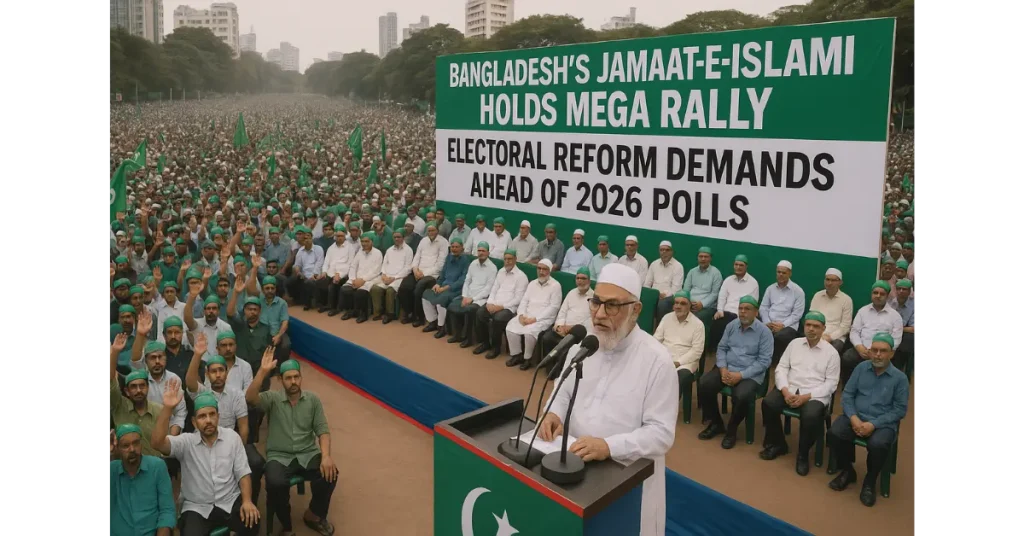In the midst of profound political change, Bangladesh witnessed the largest Islamist party, Jamaat-e-Islami, staging a historic rally at Dhaka’s iconic Suhrawardy Udyan in July 2025. Banned and sidelined for over a decade, Jamaat’s return to the national political stage has reignited debate on electoral reform, proportional representation, and the shifting alliances that define Bangladesh’s contentious road to the 2026 general elections. This article delves into the rally’s significance, the party’s reform agenda, and the complex political landscape amid recent upheavals.
Jamaat’s Political Comeback – From Ban to Mass Mobilization
Party Registration Restored in 2025
Jamaat-e-Islami’s ability to hold a mega rally stems from a pivotal Supreme Court decision in June 2025, which reversed a decade-long ban on the party’s registration. This legal breakthrough ended a period during which the party was excluded from electoral politics, allowing Jamaat to officially contest the upcoming elections.
Key Points:
- The original ban was imposed in 2013 over allegations opposing Bangladesh’s 1971 independence and subsequent convictions of top leaders by war crimes tribunals.
- The ban was upheld and enforced under former Prime Minister Sheikh Hasina’s government, noted for cracking down on opposition movements.
- Hasina’s ouster in 2024, following massive protests and allegations of authoritarian rule and electoral malpractice, created space for legal and political shifts.
Suhrawardy Udyan Rally in Dhaka: A Symbolic Return
On July 19, 2025, Jamaat staged its first solo mega rally in Dhaka since the 1970s—drawing hundreds of thousands to Suhrawardy Udyan, the hallowed ground where the Pakistani army surrendered in 1971. Party supporters, many young and politically energized, gathered to demand electoral reform and greater representation.
Rally Demands – Proportional Representation and Electoral Overhaul
The Seven-Point Charter
Jamaat presented a seven-point charter to the interim government, led by Nobel laureate Muhammad Yunus, ahead of the 2026 elections. Key demands included:
- Immediate overhaul of the election system to ensure free, fair, and participatory polls
- Adoption of proportional representation over the prevailing first-past-the-post system
- Justice for victims of past political violence and an end to political discrimination
- Restoration of political rights for opposition parties and activists
- Greater transparency and independence for the Election Commission
Why Proportional Representation?
The call for proportional representation is central to Jamaat’s demands. Under this system, parliamentary seats would mirror each party’s national vote share, potentially ending the winner-take-all paradigm and ensuring more inclusive governance. Party leaders argued this change would prevent dominance by a single party and enable diverse voices—like those of Jamaat and other minor parties—to shape legislation.
Supporter Voices and Rally Atmosphere
The Suhrawardy Udyan rally showcased:
- Tens of thousands in Jamaat-branded attire, carrying headbands and metallic badges featuring the party’s scale symbol, which the Election Commission just restored.
- Testimonies from activists like Mohammad Abdul Mannan, who spoke of years of repression and the importance of participatory democracy. The name Mannan—from Arabic, meaning “Benefactor” or “Doer of Goodness”—is emblematic of aspirations many supporters bring to the political process.
- Calls for an “Islamic country based on integrity and justice,” blending religious values with political reform agendas.
Political Context – Falling of Sheikh Hasina’s Government and New Alliances
Hasina Ousted, Awami League Banned
Sheikh Hasina, who governed Bangladesh for nearly fifteen years, resigned and fled in August 2024 after escalating protests, student-led movements, and widespread allegations of vote suppression and human rights abuses. The interim government that replaced her, under Muhammad Yunus, banned the Awami League from elections while promising reforms and credible polls in 2026.
Jamaat’s Position in a Shifting Political Landscape
With its party registration restored, Jamaat is now poised to contest all 300 seats in parliament for the first time in decades. However, the party faces a transformed political field:
- The once-steady BNP-Jamaat coalition has ended, with each party seeking to lead separate blocs—the BNP anchoring liberal and centrist opposition, Jamaat leading the conservative Islamist right.
- Jamaat’s past—including opposition to Bangladesh’s 1971 independence and the convictions of its leaders for war crimes—remains controversial and is still used by rivals to question its legitimacy.
The Legacy of War Crimes and the Struggle for Legitimacy
The Bangladesh War Crimes Tribunal and Jamaat Leaders
Much of Jamaat’s marginalization resulted from the post-2009 War Crimes Tribunal, which handed executions and lengthy prison sentences to senior party figures, including Mir Quasem Ali and others accused of collaborating with the Pakistani army during Bangladesh’s 1971 liberation struggle.
- Critics have argued that some prosecutions were politicized, while supporters of the tribunal see them as vital for national justice.
- The Supreme Court recently overturned several verdicts, such as for ATM Azharul Islam, fueling Jamaat’s claim of political victimization and the need for judicial review.
Jamaat’s Current Leadership and Vision for 2026
Shafiqur Rahman — The New Face of the Islamist Party
Jamaat’s ameer (chief), Dr. Shafiqur Rahman, exemplifies the party’s blend of religious conservatism and modern organization. A physician by training, Rahman has a decades-long history in Jamaat’s ranks and has held leadership roles since his days with Islami Chhatrashibir, the party’s student wing. Despite health scares—Rahman famously collapsed during the July rally yet continued his speech—he remains a passionate voice for change.
Agenda and Strategy
Rahman and other leaders are positioning Jamaat for mass appeal, focusing on:
- Anti-corruption
- Good governance
- Electoral fairness and inclusion
- Qur’an-based governance and social justice
The party has also sought to distance itself from its violent and divisive past, insisting on a future within a constitutional, pluralistic Bangladesh.
The 2026 Election – Dates, Expectations, and Uncertainties
Election Timeline and Political Reforms
According to the interim government, led by Chief Adviser Muhammad Yunus, the 13th Bangladeshi general elections are scheduled for the first week of February 2026, right before Ramadan. Yunus and the Election Commission have promised wide-ranging reforms to restore voter trust, improve transparency, and create a level playing field.
Key Issues at Stake
The upcoming polls will test:
- The effectiveness of new electoral frameworks, including the possibility of proportional representation
- The ability of former opposition parties to translate popular protest into parliamentary power
- The resilience of democratic norms in a country recently scarred by political violence
Two Perspectives – Potential Outcomes of Jamaat’s Return
Islamist Party Mass Rally as a Step Toward Normalization
Many see Jamaat’s mega rally as a legitimate demonstration of mass support and a positive step toward normalizing competitive multiparty democracy in Bangladesh. They argue:
- Political inclusion reduces the incentive for violent extremism
- Proportional representation could break cycles of winner-takes-all politics and repeated unrest
Risks of Further Polarization and Historical Tensions
Skeptics note the deep wounds left by war crimes and the party’s historic opposition to independence. They worry that Jamaat’s return could inflame divisions, especially if perceived as a vehicle for conservative religious governance. Detractors highlight:
- The potential for renewed street violence—party leaders themselves warn of further struggle if demands go unmet
- The opposition by secular and liberal segments to Jamaat’s social and legal goals
FAQ — Your Questions Answered
Q1: What is Jamaat demanding at the 2025 Dhaka rally?
Jamaat is demanding an electoral overhaul, including a shift to proportional representation, and seeking justice for political violence victims, transparency, and restored political rights.
Q2: Has Jamaat’s party registration been restored?
Yes, in June 2025, Bangladesh’s Supreme Court ordered Jamaat’s official registration restored, allowing it to contest in the 2026 elections.
Q3: Will Jamaat form an alliance with the BNP?
No, the BNP-Jamaat coalition ended, and both parties will contest the 2026 polls independently.
Q4: What does “Mannan” mean?
“Mannan” is an Arabic-origin Muslim name meaning “Benefactor,” “Doer of Goodness,” or “The One who Shows Kindness.” It is both a common given name and often heard among Jamaat supporters, symbolizing positive virtues.
Q5: Who leads Jamaat today?
Dr. Shafiqur Rahman, a lifelong activist and physician, is the current ameer (chief) of Jamaat-e-Islami.
Conclusion: Rallying Toward Reform
Jamaat-e-Islami’s mega rally marks an unprecedented moment in Bangladesh’s post-Hasina political revival. As demands for electoral reform echo across Suhrawardy Udyan and beyond, Jamaat’s leadership, restoration, and message of proportional representation offer a test case for the country’s journey toward participatory, pluralistic politics. The 2026 elections promise to be pivotal—not only for Jamaat’s fortunes, but for the broader questions of justice, memory, and the democratic future of Bangladesh.
Actionable Insight:
Stay informed on Bangladesh’s evolving political story by following election news, reviewing party charters, and understanding the layered history behind each rally, alliance, and reform call. The lead-up to 2026 promises profound debates and historic milestones.


